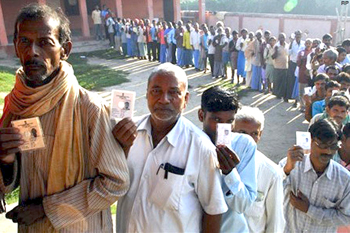New Delhi, Oct 20: Around one-fifth of the candidates in the third phase of polls in Bihar have serious criminal charges against them while almost one-fourth of them have assets more than Rs one crore.

Thirty-one candidates have declared cases related to murder while 57 candidates have declared cases of attempt to murder. Ajay Kumar, an Independent candidate from Kumhrarh constituency, has declared eight charges related to murder while Rajeev Ranjan Singh of Samras Samaj Party from Digha constituency has declared seven charges related to murder.
Among the candidates with serious criminal charges, 16 are from RJD, 11 BJP, eight each from BSP and JD(U) and 10 from SP.
Fourty-one constituencies in the third phase of Bihar Assembly elections have three or more candidates with declared criminal cases. Mokama and Digha constituencies with nine candidates have the highest number of candidates who have self-declared criminal cases against themselves.
Ramesh Sharma, an independent candidate fighting in Bikram constituency with assets worth Rs 928 crore, is the wealthiest followed by Kumar Indradev, another independent candidate fighting from Barh, is a distant second with Rs 111 crore.
Twenty-six of the BJP candidates are crorepatis while 13 each from BSP and JD(U) have assets more than Rs 1 crore. Two candidates, Yugeshwar Manjhi, an independent candidate from Asthawan constituency and Kumar Rajiv, another independent candidate from Fatwah constituency, have declared zero assets in their affidavits.
The average of assets per candidate contesting in the third phase of Bihar Assembly elections is Rs 2.40 crore.
In all the three phases, the ADR has so far analysed 1,847 candidates, out of which 402 candidates have serious criminal charges while 458 are crorepatis.





Comments
Add new comment